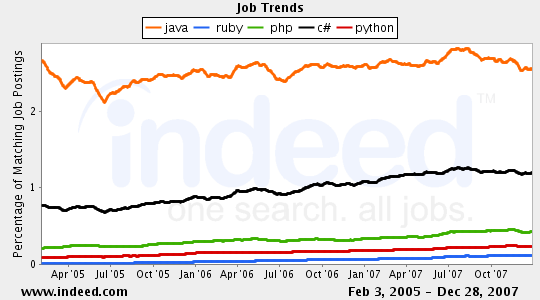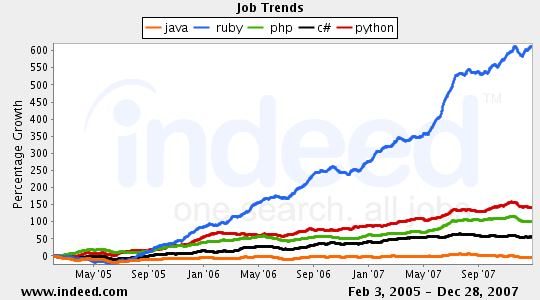Jeff Atwood just posted an article on the myth that the more years of experience a developer has, the better candidate they are for a position. In the article he references a previous post that spoke to the hypothesis that there is no correlation between skill in programming and experience. This is exactly what I was thinking when I wrote my reaction to disillusioned young IT workers.
I’m still early in my career and I’ve tried to stay on a career path that is driven by what I enjoy doing, which is hacking away at code. At the same time, I am not blind to the fact that companies do look for work experience in specific areas. This certainly helps you get your foot in the door. One thing I’ve struggled with is how do you make the transition into getting that sought-after experience?
While I have programmed in a number of different programming languages, these experiences are based on my own pet projects and curiosity of the languages. On the other hand, my professional experience can be summed up as a Java developer. I’ve been working with Java since I got out of school. While I think working with Java is great since I feel I can be productive in it and there are plenty of career opportunities, the IT industry evolves over time and we see other languages gain traction.


I don’t have any hard statistics, but I suspect the number of core programming languages an average developer extensively works with throughout their career is probably around 10-12. If you count all the supplemental languages that come with working in certain languages, like HTML, JavaScript, or SQL, this number is probably closer to 20. That sounds like a reasonable guesstimate and if true, I’ve got a long way to go.
This got me thinking about how do I continue to learn if my day-to-day is limited to one programming language. Here’s some advice I have for other Java developers.
- Follow open source – open source projects are a great way of getting exposure to a lot of the Java/JEE platform. The Java platform is a really big environment to be playing with. Open source has provided baselines for everything from database ORM projects like Hibernate/iBatis to MVC frameworks like Spring MVC/Struts to messaging infrastructure with ActiveMQ/Mule to web services with Xfire/Axis2. There is a lot to be learned and I never see a job description for Java developers without some mention of a Java open source project.
- Change the focus – What I mean here is change what you are doing most of your work relative to the system. At my first job, I mainly worked on the front-end so it was all HTML/CSS/JSP and Controllers. After awhile, I was interested in doing more of the back-end and building out infrastructure with DAOs and web services. At my current employer, I started off again on the front-end. Luckily, it was with a different MVC framework so there was good exposure there. More recently, I’ve had the opportunity to work on infrastructure and I’ve been exposed to about five new technologies I never worked with before.
By doing this, I’ve gained a lot of experience in a short amount of time with respect to working in Java. Basically, it allowed me to get more in-depth experience with Java by using Java in different contexts. This is a great start and if I was planning on working with Java my entire life, I could always continue down this path but that’s not reasonable.
HR departments love to see previous experience and it reminds me of the catch-22 that recent college graduates face. They want a job but the employer wants prior experience. They can’t get experience if the employer doesn’t them a job.
I would love to hear from people who have worked with multiple programming languages and made the language transition between jobs. If a company had a .NET position or a Rails position and you never had experience in the language, what made the company hire you and allowed you to beat out other candidates that probably had more language experience than you? What inspired you to make the paradigm shift? What advice do you have for others developers with language-limited experience?
In nearly twenty years I’ve changed my ‘primary’ programming language multiple times. It has been C, C++, Java and Perl, but these days I am back to Java again.
If you’ve learned one type of language, it isn’t difficult to learn a similar one. The hardest part is not the language ‘features’, it is all the crappy bugs that go along with the environment. That is what takes time to learn, and it is never documented (properly). If you get into the habit of continually learning new technologies, it gets easier as you get older (they’re all the same underneath: demented).
Getting a programming job, even a senior one is great, but it gets harder to find as you get older. If you want to survive, you’ll have to broaden you skill set, which also makes you worth the extra money.
‘Programming’ is just one task in building software. Analysis, design, and leadership are actually more important. Most large successful development projects have a ‘lead’ techie with a wide range of skills, as well as several seniors and a few juniors, if they are well-balanced.
Generally, if I apply for a position, then I’ve done some reading and playing with the base technologies long before the interview. I don’t try to bluff or fake it, but it is easy enough to do some reading, installing and playing, so that you at least sound interested.
Paul.
http://theprogrammersparadox.blogspot.com